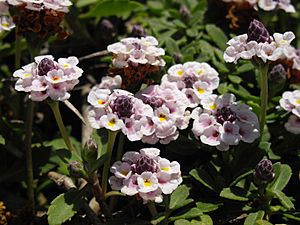Frog fruit facts for kids
Quick facts for kids Frog fruit |
|
|---|---|
 |
|
| Conservation status | |
| Scientific classification |
|
| Kingdom: | Plantae |
| Clade: | Tracheophytes |
| Clade: | Angiosperms |
| Clade: | Eudicots |
| Clade: | Asterids |
| Order: | Lamiales |
| Family: | Verbenaceae |
| Genus: | Phyla |
| Species: |
P. nodiflora
|
| Binomial name | |
| Phyla nodiflora (L.) Greene
|
|
| Script error: The function "autoWithCaption" does not exist. | |
Script error: No such module "Check for conflicting parameters".
Frog fruit (also known as Phyla nodiflora) is a cool plant that grows in many warm places around the world. It's often called sawtooth fogfruit or turkey tangle. This plant is part of the Verbenaceae family, which includes many flowering plants. It originally comes from places between northern South America and the southern United States. You can now find it in tropical areas everywhere because it has spread and grown naturally in new places. A famous book about plants, Flora Brasiliensis, even mentions it!
People often plant frog fruit in their gardens because it spreads out and covers the ground nicely. It's a great "ground cover" plant. Sometimes, you might also see it growing in yards or other disturbed areas as a common lawn weed.
Contents
What Does Frog Fruit Look Like?
The frog fruit plant has special flowers that grow in a unique way. Its flower head, called an inflorescence, has a purple center. Around this center are many tiny white or pink flowers. These flowers often look a bit like a matchstick, which is why some people call the plant matchweed.
Frog fruit is quite similar to another plant called Phyla lanceolata. However, frog fruit has much shorter leaves. Its leaves are also more rounded and not as pointed. Both of these plants are common in gardens and can also be found growing wild.
Where Does Frog Fruit Get Its Name?
This plant has many different names depending on where you are! In India, people call it bukkan in Hindi. In Marathi, it's known as ratolia or vakkan. The Tamil name for it is poduthalai. In Sanskrit, it's called vasir or vasuka.
Traditional Uses
For a long time, people have used frog fruit in traditional medicine. It has been used to help with different health issues. For example, some people use it to help with skin problems that involve pus. It's also been used to treat common colds. Another traditional use is for kidney stones, which are sometimes called lithiasis.
See also
In Spanish: Phyla para niños
 | DeHart Hubbard |
 | Wilma Rudolph |
 | Jesse Owens |
 | Jackie Joyner-Kersee |
 | Major Taylor |


